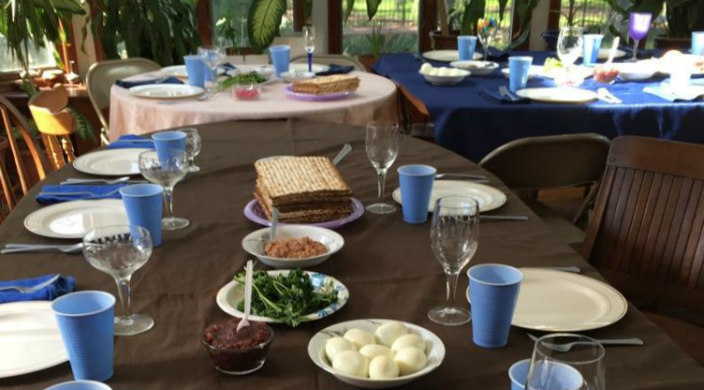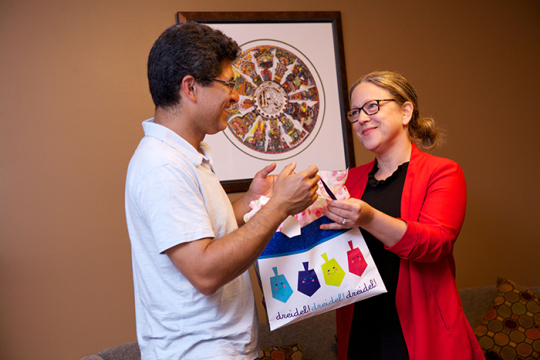
The past few days, Facebook has started showing me a variety of Passover memories. At the same time, here in the present, my inbox is flooded with new, innovative ways to celebrate Passover in the time of a pandemic, and friends are reaching out to ask if I have resources to share.
In preparation for my own Passover celebration, I’ve been scrounging around to try to find a few pounds of flat-cut brisket to make Gramma Margie’s Famous Brisket… for two. It’s a change, given that, in years past, I’ve made upwards of 25 pounds of brisket, along with gallons of chicken soup and matzah balls.
I typically spend weeks preparing for Passover, my favorite time of year. Our children are in their mid-thirties and live around the country with spouses and children, but, with very, very few exceptions, everyone always returns home for Passover. It’s a Bogdanow Family “non-negotiable,” in the best sense of the word.
The house is usually full of relatives, friends, songs, slivovitz (plum brandy), and traditions. Every year, I pull out my mother’s stained recipes and bring her back for a welcome moment. We sing “The Circle Game” at seder and include tissues near the seder plate.
This year, though, our seder experience will happen via Zoom. Guided by wonderful resources for celebrating across the distance, we’ve already begun creating a mini-seder with our children and grandchildren. I sent them “Passover packages,” and we’ll soon gather together virtually to share stories and songs.
I know we are blessed to have the technology and knowledge to do so, and I appreciate all those who are developing creative and inspiring content – but I also need to acknowledge that I feel very sad, and I suspect I am not the only one.
During this surreal period, many of us are trying hard to keep our sadness and anxiety at bay, and that’s important, keeping us from becoming paralyzed by fear and anxiety. It feels equally important, though, that we remain connected to our feelings.
Each of us is giving up so many things this year – and for me, the hardest thing to lose is our Passover seder.
It feels eerie, almost, not to be running around buying dozens of eggs and jars of horseradish and gefilte fish, not to be cooking, cleaning, and shlepping. As a planner and a prepper, I had already bought some of my supplies for the season – so now, for better or worse, I have enough wine and to last throughout this pandemic.
My back appreciates not having to lug tables and chairs up from the basement, and not moving furniture out of the living room to make room for those tables, but my heart isn’t happy about it. And last year, I sewed 50 Passover-themed napkins with the idea that they would become part of the tradition, but now they will mostly remain alone with their white tablecloth friends in our Passover Box.
I know the virtual seder will have some components of our regular seders. There will be laughter, spills, interruptions, a few bad jokes, good food, bitter horseradish, dry matzah, signs of spring, talk of freedom, off-key singing, and memories of loved ones.
But I will also be sad that I can’t touch, feel, and snuggle with my grandchildren, nor kvell as they play together. I will be sad that my pregnant daughter won’t be the center of attention she deserves to be, and that our family won’t have our morning matzah brei together, and so much more.
Rather than push those feelings away, I confess that I recently had a good cry – and it made me feel better. It felt good to feel sad, and then it felt just as good to wipe my tears and think positive thoughts about the future.
Fortunately, Judaism is a religion of cycles. As we learn in the Book of Ecclesiastes, “to everything there is a season,” and as we sing at our family’s seder, “the painted ponies go up and down.” Although I am usually sad as the seder ends, it is possible that this year, one of the most powerful moments of our seder will be the end, as we drink a toast l’chaim: “Next year together!”
For ideas for taking your seder experience online, check out "How to Make Your Virtual Seder Lively, Engaging, and Meaningful." Visit ReformJudaism.org/Passover for additional Passover resources, including recipes, customs, inserts, and more.
Related Posts

Melding Tradition and Innovation: Our Interfaith Toddler Naming Ceremony

Nine Spring-Inspired Hebrew Names
